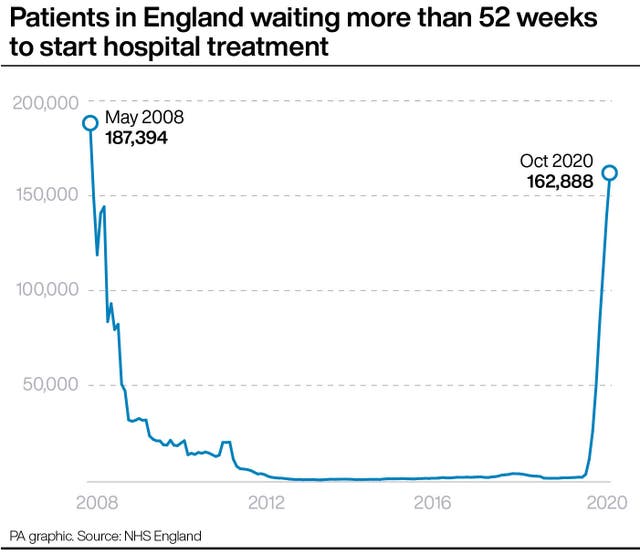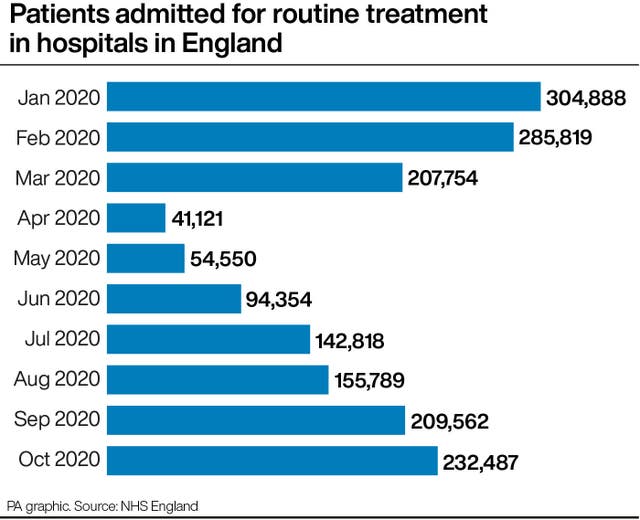More people waiting longer than a year for NHS treatment
Far more people had been waiting more than 52 weeks for treatment in October than at the same point last year.

The number of people having to wait more than 52 weeks to start hospital treatment in England continues to rise, new data shows.
NHS England figures show the number of people waiting more than a year stood at 162,888 in October – the highest number for any calendar month since May 2008, and far exceeding the 1,321 in October 2019.
The figure for October is a 17% rise on the 139,545 recorded in September.
The data does suggest, however, that the number of people admitted each month for planned treatment has been rising compared with pre-pandemic levels, though the second wave of Covid infections could be slowing progress.
Some 232,487 patients were admitted for planned treatment including surgery during October, which is the highest figure since February – before the Covid-19 pandemic hit – when 285,819 were admitted.
In May this year, as hospitals dealt with Covid patients, the year-on-year drop in admissions for planned treatments was 82%, and 43% in August.

The new figures also show that a total of 4.44 million people were waiting to start treatment at the end of October 2020.
This compares with 4.45 million who were waiting at the end of October 2019.
Meanwhile, more than 350,000 patients in England had been waiting more than six weeks for a key diagnostic test in October.
A total of 362,100 patients were waiting for one of 15 standard tests, including an MRI scan, non-obstetric ultrasound or gastroscopy.
The equivalent number waiting for more than six weeks in October 2019 was 33,200.
The number has fallen in recent months, however, after peaking at 571,500 in May 2020.
Some 203,704 urgent cancer referrals were made by GPs in England in October 2020 – the highest number since October 2019, when there were 220,304 referrals.
This suggests urgent referrals are getting back on track compared with when the pandemic hit the UK.
But emergency admissions to A&E departments at hospitals in England showed a fall last month, down 19% from 559,556 in November 2019 to 451,800 in November 2020.
NHS England said this is likely to be a consequence of the coronavirus outbreak.
Other data suggests people are still staying away from A&E departments because of Covid-19.
A&E attendances at hospitals in England continue to be below levels of a year ago – 1.5 million attendances were recorded in November 2020, down 31% from 2.1 million in November 2019.
“Although Covid hospitalisations almost doubled during November, for every Covid inpatient the NHS treated, hospitals managed to treat five other inpatients for other health conditions.
“With cancer referrals and treatments now back above usual levels, our message remains that people should continue to come forward for care when they need it.”
Nuffield Trust deputy director of research Sarah Scobie said: “These figures show the enormous impact that the pandemic is having on non-Covid-19 care.
“Between the two waves of the pandemic, the NHS was not able to catch up with the demand for scheduled care, pushing up the number of people waiting longer than a year to levels not seen since 2008.
“This build-up will take time to work through but sadly could be just the tip of the iceberg, with those people not coming into the system storing up greater care needs in the future.”
Tim Gardner, senior policy fellow at the Health Foundation, said: “The NHS is heading into a winter like no other as it works to care for patients with Covid-19, maintain routine services to tackle the backlog of unmet need and manage the seasonal surge in emergency pressures.

David Maguire, senior analyst at The King’s Fund, said: “Today’s statistics suggest that the backlog for care is worse than expected, and the 162,000 people waiting more than a year for care are only the tip of the iceberg.
“There have been just under four million fewer referrals for hospital care since March this year compared to the same time last year, with more patients having their conditions managed by their GP or in the community.
“We don’t know how many more people will need urgent or routine care next year as a result, but this can only add to the considerable backlog of 4.4 million people waiting for care.”
Professor Neil Mortensen, president of the Royal College of Surgeons of England, warned patients are being left in pain unable to carry on with “day-to-day life”.
He told the BBC that waiting times are a “national crisis” that could take two to three years to tackle.
He added: “Though we were able to recover some ground over the summer, October’s figures show that as the second wave of the pandemic began to build, so too did the pressures on planned surgery.”





